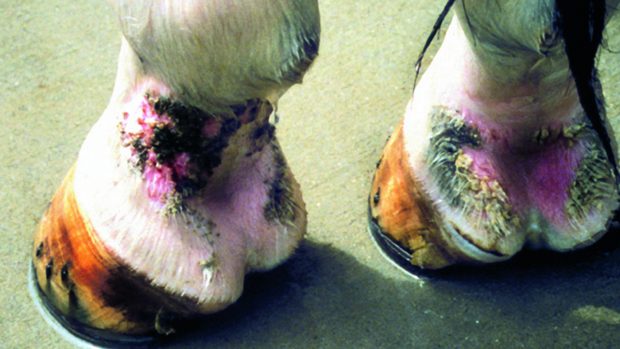The British Horse Society is being inundated with calls from concerned horse owners about the rumours that horses would be slaughtered along with livestock on an farm infected with foot and mouth.
A spokesman has confirmed that this is not the case: “Horses would NOT have to be slaughtered. They do not get the disease, and they cannot carry the disease in the medical sense, though they can transmit it via their hooves, just as humans on their boots or cars on their tyres.
The BHS want to reassure horse owners everywhere that horses on infected farms would not have to be slaughtered. This has been confirmed by Animal Health Officers at the Ministry of Agriculture.
However, they would probably have to be confined for several monthsHorse owners should not worry about their horses catching foot and mouth as the virus only affects cloven-hooved animals (cows, pig, sheep, goats, deer etc.). However, both horses and humans can spread the virus by inadvertently carrying it on theirfeet, clothing or equipment.
The BEF has said that it is vital that all horse owners, whether in an infected or restricted area or not, fully support the measures put in place by MAFF, if the spread of the disease is to be halted.
The following advice for horse owners has been published on the BEF’s website.
Advice for horse owners with no other livestock on premises
Horse owners should avoid riding through land or grazing where susceptible animals graze.
If horses leave the premises the following procedures should take place:
1) Their feet should be picked out and cleaned thoroughly with a stiff brush and water.
2) Their belly and legs should be washed.
3) After cleaning, the hooves should be painted with a suitable, MAFF-approved disinfectant which is safe to come into contact with skin; and this process should be repeated when the horses return.
4) Any transport used should be scrubbed inside and out and disinfected before travelling and on return.
5) Riders and their grooms should wear clean clothes and clean them again on return.
Horse owners with susceptible livestock on the premises
Two risks have been identified where horses are kept where there are susceptible livestock, these are:
1) Horses could bring the infection back onto the premises after being ridden and infect resident livestock.
2) Horses could spread infectionwhich exists on the premises when being ridden outside the premises.
The most important point is to ensure the effective segregation between horses and other susceptible livestock. There should be no sharing of farmyard, buildings or the equipment of personnel.





